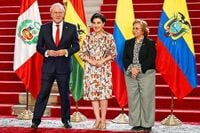As gold prices soar to unprecedented heights, a crisis is unfolding deep in the heart of Peru’s Amazon. Illegal gold mining, driven by global demand and record market values, is contaminating rivers, fish, and the people who depend on them for survival. The mounting environmental and health disaster has now drawn international scrutiny, with a landmark ruling this week from a major South American trade bloc demanding urgent reforms from Peru—and warnings from local leaders that the situation is spiraling out of control.
On October 6, 2025, the Andean Community—which includes Peru, Colombia, Ecuador, and Bolivia—delivered a stinging rebuke to Peru’s efforts to curb illegal gold mining and mercury trafficking. The bloc sided with indigenous and rural communities from the Nanay River basin, who had filed a formal complaint after years of watching their rivers and food supply poisoned by mercury. The ruling, a first of its kind, orders Peru to urgently overhaul its laws, seize mining machinery, and end extensions of a registry for informal miners that critics say have allowed illegality to flourish. If Peru fails to comply within 20 working days, the case could escalate to the bloc’s Tribunal of Justice, which holds the power to impose binding trade sanctions, including tariffs on Peruvian products within the region.
The urgency of the situation is echoed by Miguel Ángel Cadenas, a Catholic bishop who has lived in Peru’s Amazon for three decades. Speaking to The Associated Press, Bishop Cadenas described a region in crisis. "We are in a delicate situation," he said. "Given that the Amazonian diet is rich in fish, we are talking about food insecurity." The bishop cited alarming research: in Peru’s Madre de Dios region, 43% of women of childbearing age have mercury levels above World Health Organization (WHO) safety limits. Along the Amazon’s riverways, nearly 80% of residents exceed those thresholds. Tests have found mercury concentrations in fish well above what is considered safe, and hair samples from local residents tell the same grim story.
Mercury, used to separate gold from sediment in small-scale mining, is at the root of the problem. It contaminates waterways, accumulates in fish, and builds up in human bodies, causing neurological and developmental harm—particularly to children and pregnant women. The health risks are compounded by the Amazon’s limited medical services. Researchers have linked mercury exposure in the region to rashes, stomach illness, and neurological damage, with the effects rippling through entire communities.
The economic forces fueling this crisis are formidable. Gold prices, already at historic highs, are expected to average around $3,675 per ounce by late 2025, with some analysts predicting a climb toward $4,000 by 2026, according to JPMorgan. This surge has made illegal mining more lucrative than ever, and, as Bishop Cadenas warned, has attracted not just miners but also armed groups—including Colombian FARC dissidents—who threaten environmental defenders. "There are people who are being threatened with death, and this seems extremely serious to me," he said, highlighting the growing violence in the region.
Despite occasional crackdowns, enforcement remains patchy. In 2019, Peru launched Operation Mercury, a military-police action that temporarily reduced deforestation in the La Pampa mining zone. Yet much of the illegal activity simply shifted elsewhere. Authorities have seized record amounts of contraband mercury—including a four-ton shipment at Callao port earlier this year—but the trade continues to thrive, enabled by corrupt networks and inconsistent oversight. Indigenous groups insist that these efforts have not been enough to stem the tide.
Environmental lawyer Cesar Ipenza, who has closely followed the Andean Community’s ruling, argued that responsibility does not rest solely with Peru. "It is a warning to the countries that are destinations for the gold. They must have greater clarity about its origin," Ipenza told AFP. He stressed that gold-buying nations—including China, the United Arab Emirates, the United Kingdom, and Switzerland—must implement due diligence mechanisms that go beyond paperwork. "They need due diligence mechanisms beyond just paperwork, to prevent trading in gold that comes from the destruction of the Amazon, from contamination and from the violation of fundamental human rights," he said.
Indeed, reports from Switzerland and sustainability researchers have found that gold tainted with mercury is often laundered through refineries before ending up in jewelry, electronics, or national reserves. Weak traceability systems make it easier for illegally mined gold to slip into global markets, essentially masking its toxic origins. Bishop Cadenas underscored the need for international action: "As long as the price of gold continues to rise, it is very difficult for a national government to manage this situation." He added, "The first responsibility should be that those countries buying gold require traceability, so that it is not possible to pass illegal gold into legality so easily."
The Andean Community’s decision marks a historic moment. It is the first time the bloc has formally ruled against a member country on this issue, setting a precedent that could reverberate across South America. If Peru fails to act, the ruling could open the door for similar complaints and sanctions against other countries struggling with illegal mining and environmental degradation.
On the ground, the consequences are painfully clear. In Loreto, Peru’s largest Amazonian department, about 60% of the population still lacks access to potable water and sanitation—a situation Peru’s Constitutional Court declared an “unconstitutional state of affairs” two years ago, though the judgment remains unfulfilled. The recent Amazon Water Summit in Iquitos, which drew around 400 participants from Peru, Ecuador, Colombia, and Brazil, highlighted the interconnected challenges of water security, extractivism, and climate change. Yet, for many, solutions still feel out of reach.
Bishop Cadenas, who was appointed in 2021 to lead the Apostolic Vicariate of Iquitos, directed a personal plea to those driving the destruction: "Earning money is fine, but it cannot be at the cost of injustice and the lives of the poorest." He fears the situation will only worsen unless international action curbs demand for illicit gold. "Every day that passes there are more people dedicated to illegal mining. While there isn’t serious international pressure, it will be very difficult," he warned.
As the clock ticks on the Andean Community’s ultimatum, Peru faces a stark choice: take decisive action to protect its rivers, people, and future—or risk economic sanctions, continued environmental devastation, and the loss of trust at home and abroad. The world is watching, and for those living along the Amazon’s poisoned banks, the stakes could not be higher.




